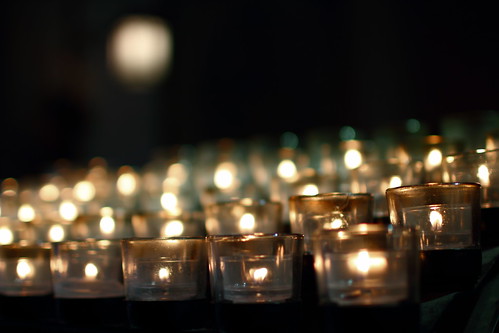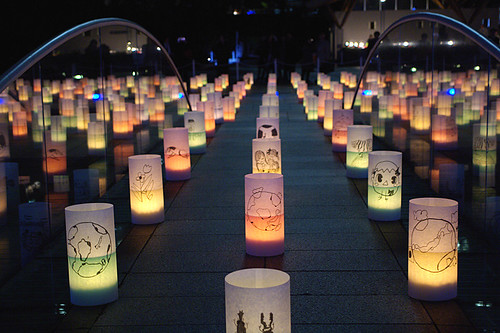If Not Me?: Candles In Babylon
Why do I pick on individuals and their actions instead of the corporations and government bodies? Surely it is the corporations etc who have the responsibility to correct the problems since I) the y caused them in the first place, and ii) they have all of the power relative to the trivial efforts of a few citizens. Guilty as these agencies may be of all sorts of moral and/or real crimes, I have a number of reasons for focusing on the individual.
At the risk of stating the obvious, what is the point of discussing a particular environmental or social justice issue if no one is going to do anything about it? What exactly is my agenda in discussing anything, be it climate change, marine pollution, or endangered species if not to somehow bring about change?
Even if the power to make change rests solely with government agencies and corporations, then someone still has to get them to make those changes. No matter how you look at it the impetus for change always has to come from the people. “The people” is not some abstract other, it is us.
Next there is the question of why would any corporation change their behaviour when we  continue to reward them for their current behaviour by buying their products? Of course we do so while self-righteously criticizing them for producing the product in the first place, but the corporations know this is to salve our own consciences and has nothing to do with our actually wanting them to change.
continue to reward them for their current behaviour by buying their products? Of course we do so while self-righteously criticizing them for producing the product in the first place, but the corporations know this is to salve our own consciences and has nothing to do with our actually wanting them to change.
The contradiction (some might say hypocrisy) is based in the delusion that it is somehow possible to provide us with all of the same goods and services at the same or lower price, while not harming the environment or some group (eg child labour) at all. Naturally this is a fiction since either the product itself and/or it’s relatively low price requires the exploitation of at least one or the other (most typically both).
One of the fundamental rules of reality is that there is ‘no free lunch’, and if there is no exploitation than the additional costs have to be paid somehow. If we “reward” corporations who try to do the right thing by letting them go bankrupt while we buy the cheaper, exploitative alternatives, then we should not be surprised that so few of them are interested in acting as we say they should.
Even where there are options such as energy derived from renewable sources, and even where those options are in the process of being implemented, the fact is that in most cases the implementation is still years away. For climate change we do not have years; the crisis is immediate and dire. For other issues it is more nuanced, but nonetheless reducible to a core moral question; just what am I saying if I support the continued exploitation of a group on the premise that at some point in the future they will not be exploited? Particularly if I can refuse to participate in that exploitation by doing without some minor luxury?
 Naturally we all need certain things to live such as basic food and shelter requirements, but our real needs are typically a fraction of what we pretend they are. Regardless of how “they” produce the goods or energy that we actually “need” to consume, we are the ones who have absolute power over the ones that we simply choose to consume (which is the lions share of our consumption). The products and services which I do not buy will not be produced, and in not being produced they will not cause any damage to the environment or any social group.
Naturally we all need certain things to live such as basic food and shelter requirements, but our real needs are typically a fraction of what we pretend they are. Regardless of how “they” produce the goods or energy that we actually “need” to consume, we are the ones who have absolute power over the ones that we simply choose to consume (which is the lions share of our consumption). The products and services which I do not buy will not be produced, and in not being produced they will not cause any damage to the environment or any social group.
Of course there are those who will raise the Red Herring of needing to purchase exploitative products so that the poor will at least have something. The answer to that one is obvious, simple, and almost universally hated. Instead of consuming exploitatively, give that money to agencies and communities that are working to create sustainable, socially just alternatives in the places in question.
We all know that only a tiny fraction of what we spend on a tropical vacation goes into the local economy, and almost none of that to those who really need it. The same amount invested in local sustainable enterprises goes almost entirely to those groups. Of course while doing a tremendous amount of good this alternative also means that a person of relative extreme privilege (ie most of us in the Industrialized world) goes without a tropical vacation or some other luxury, but is that really such tragedy?
There is also the issue of who will lead. The expectation that someone should show some moral courage and step up begs the question of who and why. If as an individual we cannot or do not, then what is the premise for expecting someone else to? On what basis do we justify the premise that it is up to them and not us?
As satisfying as it may be in the short term to pretend helplessness relative to corporations and governments, this is naturally just a self-fulfilling confirmation of our own dis-empowerment. It may ease our conscience about this mango, that article of clothing, or some other indulgence, but it really just bolsters our own sense of insignificance and meaninglessness.
Naturally this is a positive feedback loop wherein we try to address the sense of insignificance with more indulgences, and not surprisingly advertising tries to encourage that since it leads to more consumption. In that sense corporations certainly play a significant role, but ultimately it is still we who decide. In the short term we may not like taking that responsibility, but it is only empowerment when we accept responsibility for ourselves and make different choices. As inconvenient as that truth may be, it’s still true.
Admittedly empowerment is a multi-faceted, complex idea. Exactly how much  empowerment should I derive from not participating in the 10 minutes of exploitation of one labourer? Out of hundreds of millions? In not producing one kilogram of carbon dioxide out of trillions?
empowerment should I derive from not participating in the 10 minutes of exploitation of one labourer? Out of hundreds of millions? In not producing one kilogram of carbon dioxide out of trillions?
I want to suggest that this is a limited, almost meaningless perception of what empowerment is. Empowerment is not so much about what it stops as what it starts. In Judaic tradition the existence of 36 Tzaddikim (righteous men) is sufficient to save the world. This metaphor (if indeed it is only such) speaks to the fact that truth and true action change everything not merely when they are the greater force by some numeric measure, but by existing at all.
We could argue how much the world is changed by our lone actions, but indisputable is that by aligning our actions with our principles we change our own lives totally. In doing that we create the possibility of change for those around us, and in turn for those around them That is empowerment. Not the counting of certainties, but that by living our truths we create possibilities.
Through the midnight streets of Babylon
between the steel towers of their arsenals,
between the torture castles with no windows,
we race by barefoot, holding tight
our candles, trying to shield
the shivering flames, crying
'Sleepers Awake!' […]
Image credits:
candle without wind by topher76
Tea Candles by DOS82
National Cathedral Candles by Mr. T in DC
~ three candles ~ by littlenelly (rare but there)
Ambient Candle Park 2006-02 by HAMACHI!
Related Articles














2 Responses to If Not Me?: Candles In Babylon
You must be logged in to post a comment Login